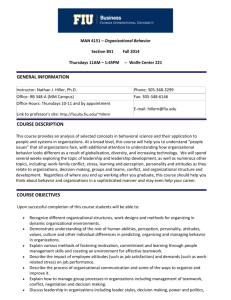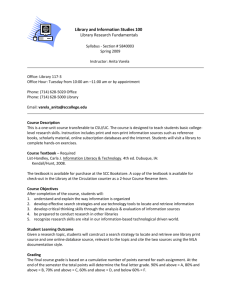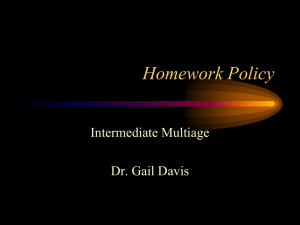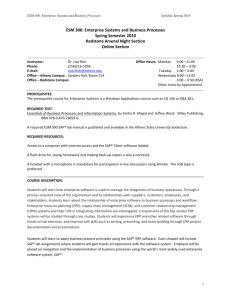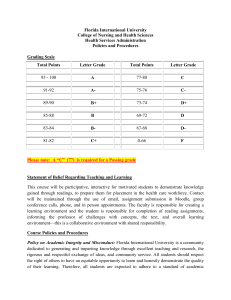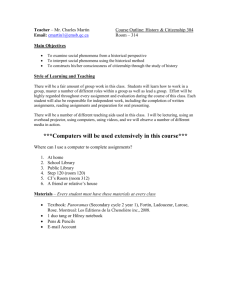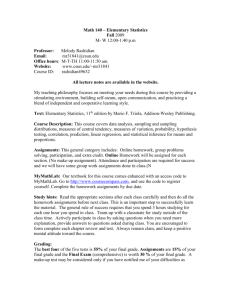MAN4164 - Leadership - FIU College of Business
advertisement
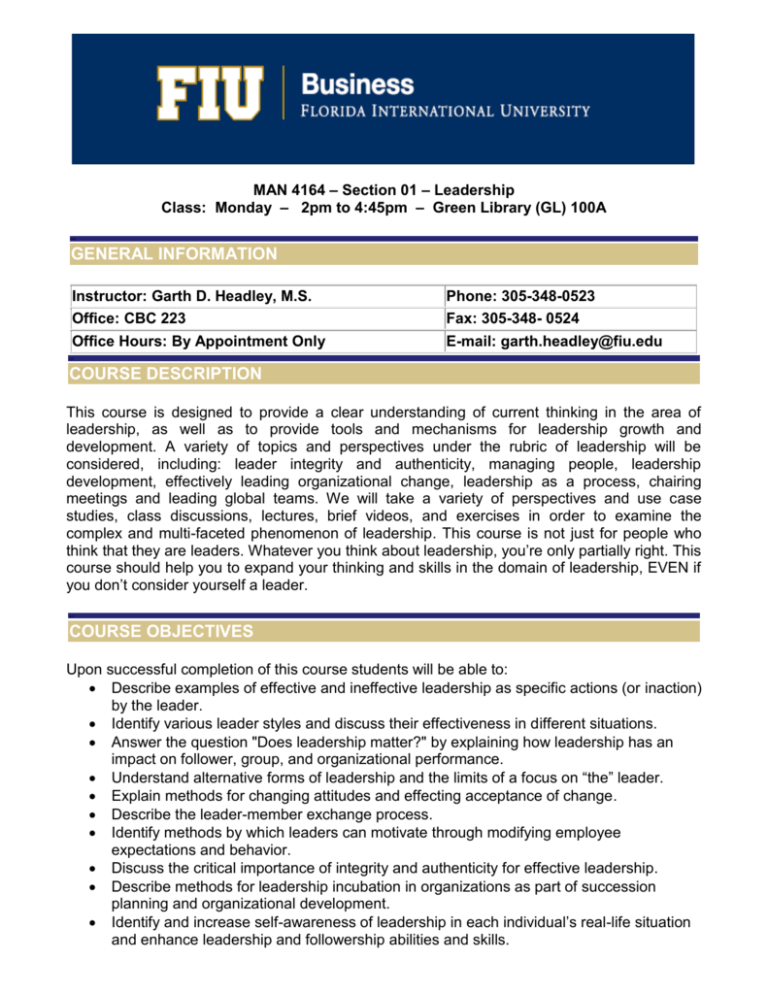
MAN 4164 – Section 01 – Leadership Class: Monday – 2pm to 4:45pm – Green Library (GL) 100A fgfgfgf GENERAL INFORMATION Instructor: Garth D. Headley, M.S. Phone: 305-348-0523 Office: CBC 223 Office Hours: By Appointment Only Fax: 305-348- 0524 E-mail: garth.headley@fiu.edu fgfgfgf COURSE DESCRIPTION This course is designed to provide a clear understanding of current thinking in the area of leadership, as well as to provide tools and mechanisms for leadership growth and development. A variety of topics and perspectives under the rubric of leadership will be considered, including: leader integrity and authenticity, managing people, leadership development, effectively leading organizational change, leadership as a process, chairing meetings and leading global teams. We will take a variety of perspectives and use case studies, class discussions, lectures, brief videos, and exercises in order to examine the complex and multi-faceted phenomenon of leadership. This course is not just for people who think that they are leaders. Whatever you think about leadership, you’re only partially right. This course should help you to expand your thinking and skills in the domain of leadership, EVEN if you don’t consider yourself a leader. fgfgfgf COURSE OBJECTIVES Upon successful completion of this course students will be able to: Describe examples of effective and ineffective leadership as specific actions (or inaction) by the leader. Identify various leader styles and discuss their effectiveness in different situations. Answer the question "Does leadership matter?" by explaining how leadership has an impact on follower, group, and organizational performance. Understand alternative forms of leadership and the limits of a focus on “the” leader. Explain methods for changing attitudes and effecting acceptance of change. Describe the leader-member exchange process. Identify methods by which leaders can motivate through modifying employee expectations and behavior. Discuss the critical importance of integrity and authenticity for effective leadership. Describe methods for leadership incubation in organizations as part of succession planning and organizational development. Identify and increase self-awareness of leadership in each individual’s real-life situation and enhance leadership and followership abilities and skills. fgfgfgf MAJOR & CURRICULUM OBJECTIVES TARGETED Communication ability Critical thinking Ethical understanding and reasoning abilities Understand and apply principles of leadership, including (but not limited to): fostering motivation, timely and effective decision-making, assessing different leadership styles, prescribing leadership styles, vision, leading in crisis, identifying critical components of enacting change and follow-through. Understand and apply principles of management, as it relates to leadership, in the following areas: planning, organizing, control, and social responsibility. Creating competitive advantage in organizations through strategic use of human capital. Understand the domestic and global economic environments of organizations as it relates to leadership. fgfgfgf TEXTBOOK There is one required textbook which can be purchased from the campus bookstore. Textbook: Leadership: Theory and Practice (6th edition) Author: Peter G. Northouse Sage Publications ISBN-13: 9781452203409 fgfgfgf TEACHING METHODOLOGY This course utilizes a number of methods in helping you to meet the learning objectives, including: case studies, brief video clips, examination of current events as they relate to leadership, and a look at research findings and cumulated knowledge from the textbook and from the instructor’s expertise. In addition, the learning experience is enhanced when students participate – which is an expectation of the course. Assignments, class notes, the syllabus, and other information will be made available on Blackboard. It is also CRITICAL that you have your email on Blackboard forwarded to an address you check regularly. fgfgfgf COURSE PREREQUISITES Senior Status For more information about prerequisites, click here. fgfgfgf COMMUNICATING WITH THE INSTRUCTOR E-mail is the preferable form of communication (garth.headley@fiu.edu) for most quick questions. I am also usually available after class, and by appointment only at my office all through the week, Monday to Friday, 9am-6pm. I will be using email to communicate with you fairly regularly. fgfgfgf GRADING Course Requirements Weights (2) Exams (30% midterm, 30% Final Exam) 60% (1) Team Assignments (15% each): Implications of Research 15% (1) Individual Assignment: Case Study 15% Class Participation/Discussion 10% Total 100% Grade Scale The following scale is used to assign final grades. Percentages will be rounded up if the value is .5 or greater. In other words, an 85.5% would be rounded up to an 86%. An 85.4% would be rounded down to an 85%. Letter Grade A AB+ B Letter Grade 93-100% B90-92 C+ 87-89 C 83-86 CRange Range 79-82 76-78 72-75 68-71 Letter Grade D F Range 65-67 <65 fgfgfgf DISCUSSION Students are expected to be active participants in the course – this includes participating in small group discussions during class and making comments/asking questions in the larger class. There is an expectation that you are present and contributing to the learning environment by being an active member of the class. Your active involvement WILL be reflected in your participation grade. I want you to challenge what you know or think you know, take charge of your own learning, get your questions answered either during or after class with your peers, or from me in or after class. Your leadership development should be a proactive endeavor during the semester. fgfgfgf ASSIGNMENTS There will be 2 assignments/papers throughout the course of the semester: One group assignment (you will be placed in groups of 3) and One individual assignment (the leadership analysis/reflection paper). Instructions will be given separately for each assignment several weeks ahead of the due date. Your analysis and write-up needs to be thorough and professionally presented. All assignments need to be submitted via Blackboard. Paper copies are not accepted. Assignments are due at 2pm on respective due dates. Late assignments lose 15% of their value per day they are late, starting at 2:01pm on the due-date. fgfgfgf Group Assignment: Implications of Research This paper is probably unlike any other assignment you’ve worked on before. But I want you to begin to think in terms of “implications”- how does what you know now, what you learn or will learn, or what is being discovered, affect the practice of leadership? As the role of leadership changes and those in the position of leader become more scrutinized and visible, their mistakes and wins more readily known, information that has the potential to improve leadership effectiveness becomes more valuable. Whether it’s in leading yourself, others or organizations, continuous learning and development will be a key part of your own continued growth. This assignment will also be submitted through Blackboard. fgfgfgf DISABILITY NOTICE If you have a disability and need assistance, please contact the Disability Resource Center (University Park : GC190; 305-348-3532) (North Campus: WUC139, 305-919-5345). Upon contact, the Disability Resource Center will review your request and contact your professors or other personnel to make arrangements for appropriate modification and/or assistance. It is your responsibility to be in touch with the DRC early in the semester so that I can make the appropriate accommodations. fgfgfgf RELIGIOUS HOLIDAYS The University's policy on religious holy days as stated in the University Catalog and Student Handbook will be followed in this class. Any student may request to be excused from class to observe a religious holy day of his or her faith. fgfgfgf RULES, POLICIES, and ACADEMIC MISCONDUCT Students are expected to pace their learning according to the posted course assignments. It is expected that interactive learning and teaching will enrich the learning experience of all students, and that each student will work in partnership with the professor to create a positive learning experience for all. Student engagement is a necessary condition for an effective learning experience, and includes contributions to debate and discussion (if any), positive interactive learning with others, and an enthusiastic attitude towards inquiry. Everyone is expected to be a positive contributor to the class learning community, and students are expected to share the responsibility of teaching each other and to be respectful of others opinion. Statement of Understanding between Professor and Student Every student must respect the right of all to have an equitable opportunity to learn and honestly demonstrate the quality of their learning. Therefore, all students must adhere to a standard of academic conduct, demonstrating respect for themselves, their fellow students, and the educational mission of the University. As a student in the College of Business taking this class: I will not represent someone else’s work as my own I will not cheat, nor will I aid in another’s cheating I will be honest in my academic endeavors I understand that if I am found responsible for academic misconduct, I will be subject to the academic misconduct procedures and sanctions as outlined in the Student Handbook Failure to adhere to the guidelines stated above may result in one of the following: Expulsion - Permanent separation of the student from the University, preventing readmission to the institution. This sanction shall be recorded on the student's transcript. Suspension - Temporary separation of the student from the University for a specific period of time. Additionally the following two documents should be used by every student in business classes that require individual or group written assignments: Certification of Authorship Assignment Cover Page (Individual) Certification of Authorship Assignment Cover Page (Groups) For details on the policy and procedure go to ACADEMIC MISCONDUCT. (Section 2.44) NOTE: Intensive Auditing of the course will be conducted to prevent academic misconduct. fgfgfgf EXPECTATION OF THIS COURSE This course is intellectually rigorous, and most students find it to be interesting and fun. But what you get out of this course is directly proportional to what you put into it. This is not the kind of course where simply swatting an answer/s guarantees you a good grade. Assimilation of information and thoughtful arguments will distinguish passing grades from A-grades. I expect that you will finish the semester with new tools and techniques that you can use in both leading and following. fgfgfgf COURSE CALENDAR Date Topic August 25 Chapter 1: Introduction September 1 Labor Day: No CLASS September 8 Chapter 2: The Trail Approach September 15 Chapters 3 and 4: Skills and Style September 22 Chapter 5: Situational Approach September 29 Chapter 6: Contingency Theory October 6 Chapter 7: Path-Goal Theory October 13 Midterm Exam October 20 Chapter 8: Leader-Member Exchange Theory Individual Assignment Due: Case Study October 27 Chapter 9: Transformational Leadership November 3 Chapter 10: Servant Leadership November 10 Chapter 11: Authentic Leadership November 17 Chapter 12: Team Leadership November 24 Chapter 14 & 15: Diversity (Women & Leadership, Culture & Leadership) December 1 Chapter 16: Leadership Ethics Group Assignment Due: Implications of Research December 8 Final Exam College of Business Administration - Enterprise Technology Center (RB 107) Tel: (305) 348-6259 | Fax: (305) 348-6882 | Email: cbasys@fiu.edu Copyright © 2006 FIU College of Business
